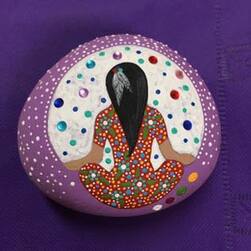 Art by Marlyn Bennett Art by Marlyn Bennett The First of 13 Moon Teachings I have come to learn that many people do not really understand what I mean when I talk about “practice knowledge”. There are many delineations of what I mean … First, some people think I am talking about the difference between theory and practice, and that when I talk about practice knowledge that I am stressing that people can have all the theory in the world but if it is not practiced it is meaningless. While I like this truth and agree I mean something different ... . Second, in the Anishinaabeg knowledge tradition it is commonly thought that the most important knowledge is the knowledge we do through our practices. What I mean by this is our parents teach us how best to do things through their practices, meaning through being good role-models. For example, through practice they teach us how to be good human beings. From this process of practice we practice it too even though we do not consciously understand the theory of ontological morality. We just do morality in practice as it was practiced for us to learn from. This means we do not necessarily have a conscious and cognitive ability to talk about the theory of morality and why it is important; rather we embody and practice it. Third, ceremony is a collection of practices. While some people are able to conduct a Sacred Pipe Ceremony because they learned it through practice from their Elders, others who were not trained in ceremonies yet who have been trained in Indigenous knowledge philosophy have the skill to talk about it in a way a ceremonialist or Elder may not be able to. Both are important. Fourth, some people who embody intergenerational trauma manifest it at the level of practice with little ability to express consciously and cognitively the very knowledge they have within their bodies. This inability does not mean they do not have knowledge about their trauma; they do at the level of embodiment and practice. When knowledge is embodied and practiced in this way, in a way that is harming to self and others, it is suggested that the person go on a journey; a journey to connect one’s heart and mind so they are better able to cope and have a good life. Fifth, some people have great ideas in that they are great thinkers but they lack the skills, or maybe the time, to manifest the ideas into concrete practice. When this happens another person can pick up the idea and work with it to ensure it moves into practice. Sixth, sometimes practice knowledge is just yours and only yours. It is not something you do for other people. For example, it is never advisable to say to an impoverished person, “I will pray for you”. Once I heard someone say this to a woman who was struggling to feed her eight children. I could tell by the look on her face that she was patronized and was thinking, “I don’t need your prayers. Stuff your prayers and help me feed my children in real and practiced ways.” Most of the time knowledge at the level of practice is the most important knowledge. Sometimes thinking or theoretical knowledge is the most important knowledge. And sometimes both together are important knowledge. Chi-Miigwetch for reading this and thinking about it.  © Lynn Gehl, Ph.D. is an Algonquin Anishinaabe-kwe from the Ottawa River Valley. In 2017 she won an Ontario Court of Appeal case on sex discrimination in The Indian Act, and is an outspoken critic of Canada's land claims process. Recently she published Claiming Anishinaabe: Decolonizing the Human Spirit. You can reach her through, and see more of her work, at www.lynngehl.com.
8 Comments
Jane
1/10/2020 11:33:08 am
Thanks Lynn. This makes total sense, and it makes sense for people from all backgrounds, I think.
Reply
Lynn Gehl
1/10/2020 02:09:48 pm
Chi-Miigwetch Jane.
Reply
Sari Stikans
1/10/2020 04:49:15 pm
Very thoughtful and well presented Lynn - thank you. I suspect that people from many cultures experience intergenerational trauma, be it physical, mental, emotional, cultural attitudes, or a combination of all mentioned. They often exhibit that they have this knowledge because of their demonstrated harm to self and others. We need leaders of this practice who help show people how to take such a journey that can connect their heart and mind. Right now, for the most part, many of us just believe that these people need to be removed and managed away from the rest of society. There must be ways that we can encourage or help others to take this type of journey.
Reply
Lynn Gehl
1/11/2020 07:12:59 am
Miigwetch. I like how you say this: "They often exhibit that they have this knowledge because of their demonstrated harm to self and others."
Reply
Marion Little
1/10/2020 06:26:54 pm
Thanks for sharing these insights Lynn. I appreciate your invitation to reflect on all these aspects of practice knowledge.
Reply
Lynn Gehl
1/11/2020 07:12:23 am
Miigwetch
Reply
Monica
1/11/2020 08:29:13 pm
Thank you for your teachings Lynn. I am working on my Indigenous Knowledge and am enjoying it very much. It is finally sinking in.
Reply
Lynn Gehl
1/12/2020 08:19:41 am
great!
Reply
Your comment will be posted after it is approved.
Leave a Reply. |
|
To subscribe to Lynn's Blog: click here
To subscribe to Lynn's Newsletter: click here To follow Lynn on her Public Facebook Page: click here To subscribe to Lynn's YouTube channel: click here To book Lynn as a speaker: click here To contact Lynn/License her work: click here Copyright Dr. Lynn Gehl, 2024 All Rights Reserved
|
 RSS Feed
RSS Feed
